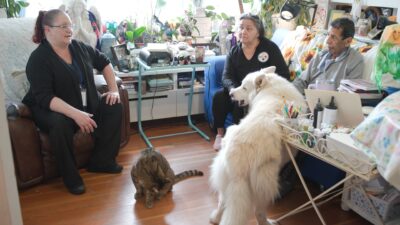Here are other losses that may cause people to experience grief:
- Non-death loss, or the loss of a valued relationship, possession, ability, or activity. These losses may be ongoing, as in the case of estrangement, or permanent, such as when a job is eliminated.
- Death of an animal companion. Many people have strong attachments to their animal companions. Sometimes that relationship is a person’s most important attachment, and grief may be overwhelming when the animal dies. Sometimes, the loss of the animal companion may be linked to another loss, adding another layer to the grief experience. For example, the dog that died was a gift from a now deceased spouse.
- Impending and mounting loss, also known as anticipatory grief. Family, friends, and even professionals who are caring for a dying person may experience this type of grief as the patient’s abilities and essential characteristics decline and their death appears likely.
- Uncertain/ambiguous loss, either “catastrophic” or “more common,” as defined by researcher and therapist Pauline Boss, PhD. Ambiguous loss may be physical with a psychological presence, as in the case of an unresolved kidnapping (catastrophic) or an empty nest (more common). Or it may be psychological with a physical presence, as in traumatic brain injury (catastrophic) or addiction (more common).
- Secondary loss, or the non-death loss(es) that occur because of a death or other “primary” loss. For example, the death of a spouse (primary loss) may require the surviving spouse to relocate, leading to the loss of a home and community (secondary loss). A secondary loss may be unrelated to death, such as an athlete losing the ability to participate in a beloved sport (secondary loss) after an accident that resulted in amputation of a limb (primary loss).
- Communal loss, or loss experienced by a group of people because of a natural or manmade disaster; mistreatment, violence, or prejudice; or economic, gender, or sexual oppression. In the wake of such losses, the community may experience “collective grief.” For example, recent research has focused on Black grief, examining how slavery, prejudice, and economic and social hardship have resulted in loss and pervasive grief for generations of Black Americans.
Often, the losses described above are not openly acknowledged, socially supported, or publicly mourned, leading to disenfranchised grief, a concept first identified in 1989 by HFA’s grief expert, Kenneth J. Doka, PhD. Formal or informal support of individuals who are grieving can help to validate disenfranchised grief.
Learn more about disenfranchised grief here.


